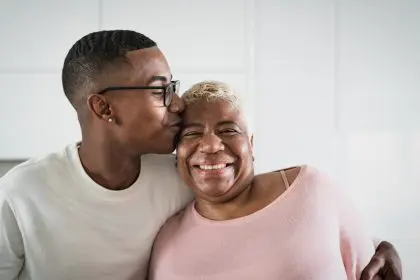There is a sacred alchemy that happens when a woman’s body creates life. For a time—whether weeks or months—you held the universe within your womb. Then, in a moment that defied all expectation, that universe collapsed. The stars went dark. But hear this truth that many whisper but few proclaim: you are no less celestial for having experienced this eclipse. You are a mother beyond the miscarriage.
When we lose a pregnancy, we lose not just the physical presence of possibility, but the constellation of dreams that had already taken shape in our hearts. The first steps we would witness. The tiny hand wrapped around our finger. The future birthdays and milestones we had already begun celebrating in our imagination. This loss carves a hollow space inside us that can feel bottomless. But this space, too, is sacred. It belongs to you. It is evidence of your capacity for love.
The journey through grief after miscarriage is not linear. It spirals and curves, retreats and advances. Some days feel impossible; others bring unexpected moments of peace. Throughout this winding path, remember this: healing doesn’t mean forgetting. It means finding a way to carry this experience with grace, to let it transform rather than diminish you.
Here are seven emotional pathways to healing—each one an invitation to reclaim your wholeness, to honor your experience, and to remember that motherhood transcends physical outcomes.
1. Embracing Grief Without Drowning
Grief is the shadow cast by love. The depth of your sorrow reflects the immensity of your capacity to care, to nurture, to love unconditionally. This grief deserves space and acknowledgment.
Too often, women are encouraged to “move on” quickly after miscarriage. Friends and family, uncomfortable with your pain, may offer platitudes: “You can try again,” or “It wasn’t meant to be.” These well-intentioned words can feel like erasure, as if your baby—and your motherhood—never existed.
Give yourself permission to grieve fully. Name your feelings without judgment: the anger that burns, the jealousy that stings when you see pregnant women, the profound sadness that can make even breathing feel impossible. These emotions aren’t weakness—they are your heart’s testimony to what matters.
Journal through your darkest thoughts. Speak your baby’s name aloud if you gave them one. Perform small rituals that acknowledge their existence—light a candle on significant dates, plant something that blooms, create art that expresses what words cannot.
2. Reclaiming Your Body as Sacred
After miscarriage, many women describe feeling betrayed by their bodies. The vessel that was meant to nurture and protect somehow failed in its most fundamental purpose. This perception—though understandable—binds us in shame.
Your body did not fail. Your body loved. Your body nourished. Your body tried with every cell to create miracle. That the miracle ended prematurely reflects the profound mystery and fragility of life, not your inadequacy as a woman.
Begin the practice of treating your body with tender reverence. Speak to it with the compassion you would offer your dearest friend. Touch your abdomen gently and thank it for trying so hard, for opening itself to the vulnerability of creation. Nourish it with foods that heal and strengthen. Move it in ways that reconnect you to its wisdom and power.
Consider a cleansing ritual—a bath infused with salt and healing herbs, a gentle massage, a yoga practice dedicated to honoring your womb space. These acts are not mere self-care; they are sacred ceremonies of reconciliation between your consciousness and your physical form.
3. Transforming Guilt into Compassion
Perhaps the most poisonous emotion after miscarriage is guilt. The endless loop of “what ifs” and “if onlys” that haunt the 3 AM darkness. The scrutiny of every action, every food eaten, every stress experienced. The desperate search for where responsibility lies.
This guilt serves no healing purpose. The vast majority of miscarriages happen due to chromosomal abnormalities and complex biological factors entirely beyond your control. Nature makes these difficult decisions at a cellular level that has nothing to do with your worthiness or actions.
When guilt arises—and it will—practice this radical response: meet it with the same compassion you would offer a dear friend experiencing loss. Would you interrogate her choices? Would you imply that she should have somehow prevented the unpreventable? No. You would hold her hands and remind her of the courage it takes to love so openly.
Be that compassionate friend to yourself. When the guilt whispers its accusations, respond with gentle truth: “I did the best I could with the knowledge I had. I loved this baby with my whole heart. That love is what defines my motherhood, not the outcome.”
4. Finding Language for the Unspeakable
One of the cruelest aspects of miscarriage is how our culture has traditionally shrouded it in silence. Without words, without ritual, without community acknowledgment, this profound loss can feel unreal, invalid, invisible.
Reclaim your story by finding language for your experience. This doesn’t mean you must announce your loss widely if that doesn’t feel right, but it does mean refusing to participate in your own erasure.
Find or create spaces where your full experience is welcomed—support groups, online communities, therapy sessions, conversations with trusted friends who can bear witness without trying to fix or minimize. Sometimes, the simple act of speaking aloud what has happened—of making the invisible visible—brings profound relief.
Remember: naming your experience does not magnify your pain; it begins to give it shape and boundaries. What remains unnamed holds power over us in ways we cannot address. Your story deserves voice, deserves space, deserves to be carried by loving community.
5. Redefining Motherhood Beyond Biology
Perhaps the most transformative realization after miscarriage is that motherhood is not defined by outcomes but by love. You loved completely. You made space in your body, your heart, your future for another being. That love—not the duration of pregnancy or the physical presence of a child—is what makes you a mother.
Our culture’s narrow definition of motherhood as successful biological reproduction fails to honor the vast spectrum of maternal experience. The woman who miscarries, the woman struggling with infertility, the woman who chooses not to have children but nurtures in other profound ways—all express the feminine principle of creation and care.
Consider how you might honor your maternal energy beyond the conventional pathways. This isn’t about “replacement” for what was lost but about recognizing the many expressions your nurturing spirit might take: mentoring, creating art, nurturing community, loving the children already in your life, or bringing more compassion to a world desperately in need of it.
6. Embracing the Paradox of Remembering and Moving Forward
Healing from miscarriage requires holding two seemingly contradictory truths: that you will always remember and love the baby you lost, and that you can and will find joy again. This is not betrayal. This is the mysterious alchemy of the human heart—its capacity to carry sorrow and joy simultaneously.
Create tangible ways to remember your baby that can travel with you through life. Perhaps a piece of jewelry with a significant birthstone, a tattoo with symbolic meaning, an annual ritual of remembrance, or a dedicated space in your home with a meaningful object. These touchstones acknowledge that this soul, however briefly present, changed you forever.
At the same time, grant yourself full permission to laugh again, to plan for the future, to hope, to find purpose and pleasure in living. The depth of your grief reflects the depth of your love—and that same capacity for profound feeling will eventually become the wellspring of your joy.
7. Letting Love Illuminate the Path Forward
After the initial shock of loss subsides, many women describe feeling fundamentally changed—as if the map of their hearts has been permanently redrawn. This transformation, though painful, carries profound potential for a more authentic, compassionate life.
The love you feel for your baby—a love that exists despite physical absence—is one of the purest expressions of unconditional love humans can experience. It asks nothing in return. It continues despite the lack of shared experiences or memories. It simply is.
Let this love become your teacher. Let it show you what matters most: presence over perfection, connection over achievement, compassion over judgment. Let it soften the edges of your expectations—for yourself and others. Let it illuminate the tender, vulnerable places in those around you that need gentleness rather than criticism.
The Continuing Journey
Healing from miscarriage is not a destination but a continuing journey. Some days will still bring tears, even years later. Certain dates may always carry a bittersweet weight. The wondering—who they might have become—may never completely cease.
Yet in this continuing journey, most women discover that the sharp edges of grief gradually soften. The love remains—perhaps grows even stronger—but it transforms from a pain that immobilizes to a force that motivates compassion, connection, and purposeful living.
You are changed, yes. But not diminished. The hollow space grief carved inside you doesn’t remain empty forever. Slowly, tenderly, it fills with wisdom that could come no other way. With compassion born of suffering. With appreciation for life’s fragility and preciousness. With a deeper capacity to love without guarantee.
You are a mother beyond the miscarriage. Your body knew how to begin creating life. Your heart knew how to love without condition. Your soul knows how to carry this love forward, transforming pain into purpose, absence into presence.
This is your undiminished power as a woman—not defined by outcomes but by the courage to love completely, to grieve honestly, and to let that love illuminate not just your path, but the paths of all who encounter your hard-won wisdom.

















